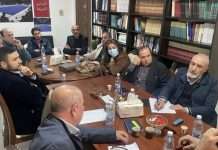Sharing the Blame for Terrorism
Osman Mirghani/Asharq AlAwsat
Friday, 16 Jan, 2015
Claiming that Islam is fully responsible for terrorism now seems easier than arguing that the West, or rather its governments, also shoulders part of the responsibility. In light of the fierce debate taking place over almost the whole world on this issue, and the bickering in the Arab and Muslim worlds, it is now difficult to discuss the topic logically and fully without stirring sensitivities. However, there needs to be an exhaustive conversation on the issue if we truly want to crush the vicious and dangerous blight that is terrorism.
It is not difficult to find voices that consider either Islam or the West fully responsible for breeding terrorism. But between these two sides of the spectrum there is a gray area where it is impossible to place full responsibility on Islam and Muslims and completely absolve Western governments of their role, after they have pursued policies, interventions or wars that created fertile ground for terrorism to grow.
No rational being can pardon Muslims for their part in the growing climate of extremism in which terrorism grows, or for the terrorist attacks their sons have carried out in the region and in Western capitals. Muslims bear responsibility and should have a role in fighting extremist ideology and confronting its preachers and advocates. Defending Islam requires removing impurities produced by the behavior of a radical minority, as well as countering their deviant ideology that continues to mislead Muslim youth and push them into committing the massacres carried out by terrorists. In short, inside all Muslim countries there is a battle taking place between moderation and extremism, between a peaceful and tolerant majority and a violent minority, imbued with excess and hatred. The silence of the majority on this issue is no longer acceptable.
On the other hand, some Western governments bear responsibility for either following policies or pursuing an interventionist strategy that has fed feelings of injustice in hotbeds of extremism. The very “War on Terror” the West declared in the wake of the September 11, 2001 attacks veered from its original course of being an international war on terrorism, whose confrontation and defeat required true global cooperation and coordination. As a result, it saw abuses that led to a state of chaos and violence, and created a nourishing environment for the preachers of extremism.
There were some objective and brave analysts in the West who critically approached the outcomes of the military operations, including the drone attacks, that killed both terrorists and innocent civilians in Afghanistan and Iraq. On the other hand, there were those who fueled a spirit of hatred against Islam and Muslims, promoting sweeping generalizations that harmed the moderate majority of Muslims, while benefiting the extremists on both sides.
If the discourse of hate and incitement is to be rejected by its adherents, then surely the discourse of Islamophobia should be equally rejected by the West. A new trend of attacking Islam as a religion and resorting to negative stereotypes of Muslims has emerged in several Western circles, spreading feelings of blind hostility and hatred toward Muslims in the West. Muslims increasingly feel that they are being targeted and their religion smeared. Terrorist operations are carried out by a minority that does not represent the majority of Muslims, who unreservedly reject and condemn terrorism. Muslims are also victims of terrorism and extremism; in fact they are the primary victim. According to the most recent figures, most of the tens of thousands of lives claimed by terrorist attacks since 2000 all over the world have been nationals of Muslim countries.
The West needs to consider some of the questions that repeatedly go unaddressed, such as: why do terrorist groups and extremist ideologies succeed in attracting Muslim youths who were born in the West, exposed to its values and educated in its schools? Why do Muslim youths in the West feel a sense of injustice and marginalization?
Terrorism is an unpleasant phenomenon and its reasons are complex and not related exclusively to religion; other political and social factors are involved. In addition, there are the ethnic and nationalistic conflicts that feed into the issue. The West has also suffered from political, religious and nationalist terrorism but we did not hear of Christianity or an entire nation being branded as inherently violent in the way Muslims and Islam are. The war on terror requires international efforts and a thorough approach that addresses all the causes of terrorism, including extremist hotbeds and feelings of injustice and humiliation. Otherwise, we will remain stuck in a vicious circle while terrorism continues to claim more lives and create a huge rift between the Muslim world and the West.



















